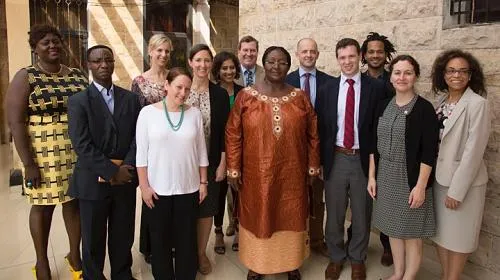A delegation of Congressional staffers travels with CARE to see how U.S. investments are paying off with better health outcomes for women and their families.
WASHINGTON (June 3, 2016) – A group of Congressional staffers from Kansas, Missouri, Washington and West Virginia traveled with the poverty-fighting organization CARE to Sierra Leone and Cote d’Ivoire to see how vital U.S. investments and partnerships are improving health outcomes for women and their families. This group was joined by representatives from the U.S. Agency for International Development (USAID) and the Global Health Corps, in addition to a U.S.-based freelance journalist.
This six-day trip highlighted the important role of good health and education, which is critical to breaking the cycle of poverty. Throughout the trip, the delegation saw how simple solutions – such as access to quality health care services at every stage of a woman’s life – can help ensure women, their families and communities are able to survive and thrive. These crucial health care services include pre- and post-natal care, vaccinations, nutrition counseling and family planning.
The delegates began their journey in Sierra Leone, a country that is currently grappling with high poverty rates and very weak health indicators. These challenges have been further exacerbated by the 2014 Ebola outbreak in West Africa, as well as an 11-year civil war that devastated much of the country’s infrastructure. On the trip, the delegation visited a girls’ empowerment program, met with community health workers and toured a peri-urban health center. They also had a chance to meet with Ebola survivors and widows to discuss the economic opportunities available to widows to become financially self-sufficient.
Next, the delegation traveled to Cote d’Ivoire, where they witnessed the many obstacles women face in terms of access to health services, including cost, lack of transportation and cultural norms. The delegation met with community health workers, toured a women’s justice center and visited a husband community school, which educates men about the importance of quality health services for women. They also visited CARE’s Village Savings and Loan Association (VSLA) program, which was pioneered by CARE 25 years ago, providing women with access to financial services and economic self-sufficiency. While Côte d’Ivoire did not experience the same level of Ebola outbreaks, the situation did highlight the country’s inability to respond adequately to the crisis, particularly given the lack of health infrastructure and health services in place.
This Learning Tour was an important opportunity to witness proven solutions at work that can end preventable maternal and child deaths for women in Sierra Leone and Cote d’Ivoire and around the world. In partnership, we can build a smart, strategic, long-term approach to health policies that emphasizes the implementation of proven solutions and leverages the influence and special capabilities of the United States, motivating other governments and organizations to do more to advance women’s health and create lasting collaborations that can transform the lives of millions.
Participants in CARE’s May 2016 Learning Tour to Sierra Leone and Cote d’Ivoire included:
• Leslie Goldman Alter, Freelance Journalist
• Heather Anderson, Senior Vice President of Programs, Global Health Corps
• Jeffrey Levicki, Press Assistant, Rep. Lynn Jenkins (R-KS-2)
• Michael Lowry, Legislative Director, Rep. Ann Wagner (R-MO-2)
• Evan McMullin, Senior Policy Advisor, Rep. Cathy McMorris Rodgers (R-WA-5)
• Dana Richter, Legislative Assistant, Sen. Shelley Moore Capito (R-WV)
• Nandita Thatte, Senior Technical Advisor, Office of Population and Reproductive Health, U.S. Agency for International Development (USAID)
For more information on CARE’s Learning Tours, please visit: www.care.org/LearningTours.
The CARE Learning Tours program is funded by the Bill & Melinda Gates Foundation.
About CARE: Founded in 1945 with the creation of the CARE Package®, CARE is a leading humanitarian organization fighting global poverty. CARE places special focus on working alongside poor girls and women because, equipped with the proper resources, they have the power to lift whole families and entire communities out of poverty. Last year CARE worked in 90 countries and reached more than 72 million people around the world. To learn more, visit www.care.org.
Media Contacts:
Nicole Ellis, +1-202-560-1791, nicole.ellis@care.org

